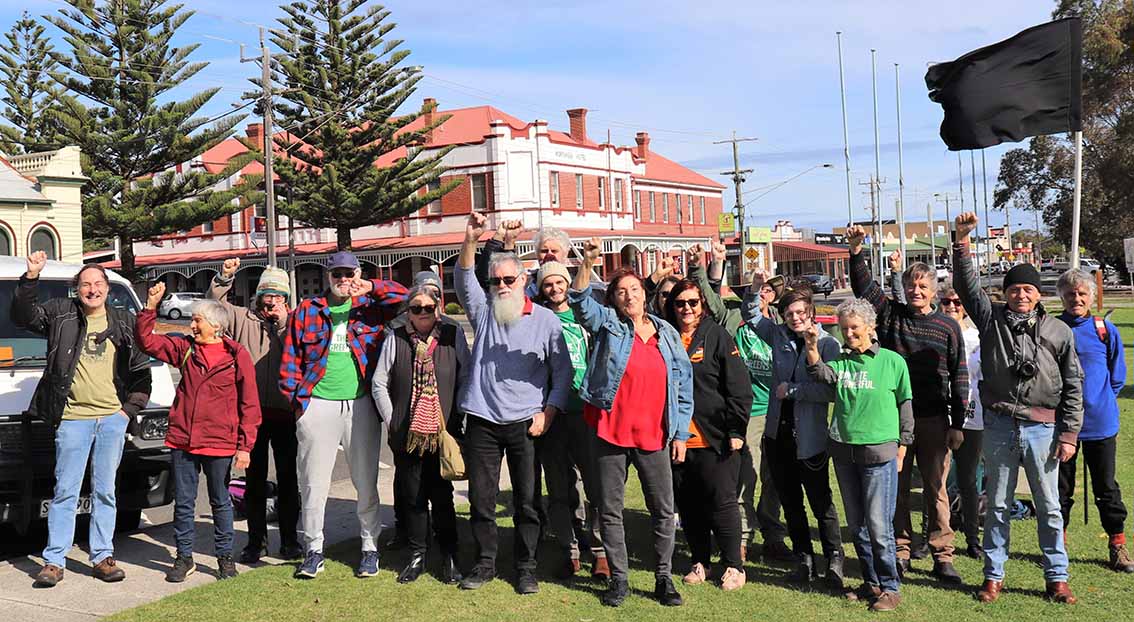CHRISTMAS, bah humbug. Anzac Day, hijacked by politicians. Grand Final, nah. Give me May Day – May the 1st – when a motley crew of old socialists, greenies, romantics, ne’er-do-wells and dreamers gather in Wonthaggi’s Apex Park for an old ritual.
The deafening hoot of the old mine whistle kicks things off, which is appropriate since May Day celebrates the struggle of workers around the world to achieve an eight-hour working day, and this whistle once signalled the start and finish of the miners’ shifts at the State Coal Mine.
So come brothers and sisters
For the struggle carries on
The Internationale
Unites the world in song …
Leslie, wearing her unionist T-shirt, whacks the tambourine. Most of us hum. Not too many of us know the words, or have actually done a hard day’s physical work in our lives, at least for pay. We grin at one another as we raise our fists in solidarity.
When I arrived in Australia in 1981, it was the lucky country, and there was plenty of good fortune to go around. Almost everyone belonged to a union and you didn’t mess with the unions. Cleaners earned enough to buy a house. There were plenty of houses and they cost bugger all.
We never guessed it was just a passing phase. We could not have imagined Australia would become like so many other unlucky counties: a place where a secure job is just a dream for many, where a large proportion of people will never own their own home and can barely afford to rent one.
It feels especially poignant in Wonthaggi which led Australia in so many industrial reforms, a unique country town with a hospital, a medical benefit fund, a co-operative store (which they jointly owned and which sold everything from cars to funerals), a dispensary and a theatre.
This is the second iteration of Wonthaggi’s May Day celebrations. The first iteration lasted 60 years. It was a big event. The union and the women’s auxiliary led the march down Graham Street, McBride Avenue, then Murray Street, with crowds watching from the footpaths.
In 1937, 200 miners and their families travelled in convoy to the Melbourne May Day march with their union banners. And there’s that famous photograph: the Melbourne May Day parade in 1956 with the Wonthaggi contingent striding out, banner held aloft, a young Roy Hamilton dressed in his school uniform in the midst of our gallant miners.
I love this bit. The speeches are short and punchy and varied. Violence against women is the burning issue this year. Dave talks about his experiences as a lawyer and Ken reads an extract from Don Watson’s Diary of a Bleeding Heart describing Paul Keating’s moves to end family violence once and for all. That was in the 1990s and we know how it went.
Margaret, a former union organiser, speaks about the AUKUS military alliance, the immense costs to Australia of blindly following the US once more.
Catherine and Aidan perform an anti-war ballad The Universal Soldier, and are followed by Kevin, a former army major, who speaks of humble soldiers and peacekeepers doing their best in difficult circumstances.
Mat gets stuck into the supermarkets, “ripping off their workers, their customers and their suppliers” (big cheer!) and hails the new unions fighting for workers’ pay and rights.
Samiro talks about her research into notions of white privilege. Jessica appeals for volunteers to join her in organising a “fly a flag for Gaza” event at Cape Paterson, and to help safeguard middens at Inverloch.
And then it’s time for a musical finale: Solidarity Forever. Like most folk songs, this one’s ever changing and Strat and Lyndal have written a new, less blokey verse to suit the times:
In our schools and in our hospitals and care facilities
Those who work in retail and hospitality
When we all stand together we will win equality
For the Union makes us strong!
It doesn’t look so good on the page but it works in the open air with a brass backing. In fact it sounds so good, we sing it again.
And with a rousing cheer, that’s it for another year. Can we ever return to a workers’ paradise? Only if we work for it, like the Wonthaggi miners did.


